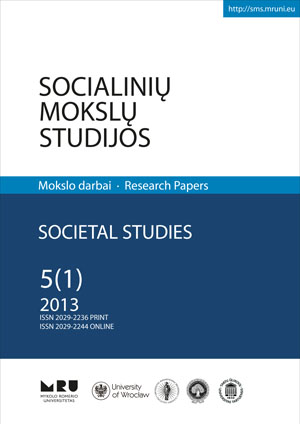Autoritarizmo veiksniai ir diagnostiniai instrumentai
The Factors of Authoritarianism and Diagnostic Tools
Author(s): Aistė StankuvienėSubject(s): Social Sciences
Published by: Mykolas Romeris University
Keywords: authoritarianism; authoritarian relations; organization of labour; human factors; close environment; macro environment
Summary/Abstract: Not enough attention within the field of social sciences is paid to the problem of authoritarianism. In spite of the fact that this theme has not been deeply analysed, some of the evidence allows us to think that an authoritarian way of mind is usual for the inhabitants of our country. In this article the features of the development of authoritarianism are studied from a multidisciplinary point of view, revealing its existence in the modern organization of Lithuanian labour. In this article the groups of factors which have the biggest influence on the existence of authoritarian relations (human factors, close environment and macro environment), performed research and studies of the 20th century, diagnostic tools are studied, the need for research on the development of authoritarianism within modern Lithuania is substantiated. Theoretical analysis performed in this article revealed differences and even discrepancies between different scientific theories, studies and researching strategies. Most of the scientists look for the reasons in personal features, behaviour, life experience. The other scientists concentrate on the culture of internal relations within organizations. Some of the scientists say that not only personal features influence personality, but also behaviour, the close environment, which means that most probably permanent mutual interaction between human and environmental factors takes place in this phenomenon. There is no unanimous opinion of what indicators should be chosen for the evaluation of this phenomenon. Their different compositions cause different results. Research experience shows that this phenomenon is influenced by many factors. Personal features cannot be separated from others factors which have influence on authoritarianism, such as the internal culture of organization, relations, etc., including macro factors which sometimes are even more important than personal features. That means that the union of these factors at an exact location and time gives different synergetic effects. It would be expedient to perform a study on intercultural authoritarian relations, which would allow testing of the universality and predictive interpretational power of traditional theories.
Journal: Socialinių mokslų studijos
- Issue Year: 5/2013
- Issue No: 1
- Page Range: 57-73
- Page Count: 18
- Language: Lithuanian

